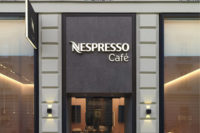US Coffee Consumers Now Expect an Elevated Coffee Experience At Home and Away
Sales of espresso machines, French presses, and cold brew makers have grown by double-digits

Coffee is the fuel that many US consumers turn to daily to get the day started, keep it going, and sometimes to escape from it. Wherever there is coffee, coffee-loving consumers will find it. They prepare and drink coffee at home, buy it from coffeehouses, restaurants, foodservice outlets, convenience and grocery stores, and vending machines. According to The NPD Group, last year, consumers drank approximately 44.5 billion servings of coffee, spent $2 billion on coffee makers and accessories for in-home brewing, and made 6.3 billion visits to order coffee at foodservice outlets.
In-Home Coffee Consumption and Preparation
Before the pandemic, consumers sourced about 73% of coffee servings from home and 27% from foodservice. The split between at-home and away-from-home coffee consumption became 81% from home and 19% from foodservice during the pandemic. With fewer opportunities to visit their favorite coffee shop, consumers re-created the gourmet coffee experience in their homes. Sales of espresso machines, French presses, and cold brew makers grew by double-digits in the year ending May 2021 compared to the same period a year ago. Coffee accessories, like temperature-controlled mugs and milk frother wands, also experienced double-digit growth. Sales of frothers, for example, increased by 120% this May compared to a year ago, reports NPD.
The interest in preparing gourmet coffee at home was already in play before the pandemic. Although 82% of US households own a coffee maker, usage of traditional coffeemakers continues to decline as consumers look for coffee appliances that offer variety and an elevated coffee experience. Sales and use of pod-style, French and other presses, and pour-over coffee makers have increased over the past three years.
"Consumers' palates are more sophisticated now when it comes to coffee. They've invested their time and money in bringing a gourmet coffee experience into their homes," says Joe Derochowski, home industry advisor at The NPD Group. "Even when they're back to work or school, they'll continue to get a return on their investment. Manufacturers can benefit by offering great taste, which is always key, the ability to adjust the taste, and versatility in enabling consumers to get that coffee house experience at home."
Foodservice/Restaurant Coffee Consumption
Lockdowns and restaurant restrictions during the pandemic did impact coffee servings ordered at US restaurants and foodservice outlets. In the year ending May 2021, coffee servings ordered at commercial foodservice declined by -7% from a year ago, and for a pre-pandemic view, it decreased by -11% from two years ago. Consumers also cut down on visits to their favorite coffee house and gourmet coffee chain. Visits to these types of outlets declined by -6% in the period compared to a year ago, and -8% from two years ago. Still, coffee shops, independent and chains, have been among the strongest performing restaurant channels over the long term, and as the country emerges from the pandemic, visits improve.
When purchasing coffee at foodservice outlets, consumers prefer specialty coffee beverages over regular coffee. Specialty coffee servings orders at foodservice outlets overall represent 44% of orders, and regular coffee, 40%. Specialty coffee holds 71% of servings ordered at coffee shops, and regular coffee represents 29% of servings.
"Coffee has been a go-to beverage in the US for a very long time, but it has evolved over the last ten years," says Darren Seifer, food and beverage industry analyst at The NPD Group. "Today's consumers are looking to elevate and personalize their coffee experience with new flavors, recipes, tastes, appliances, and accessories."
Looking for a reprint of this article?
From high-res PDFs to custom plaques, order your copy today!





